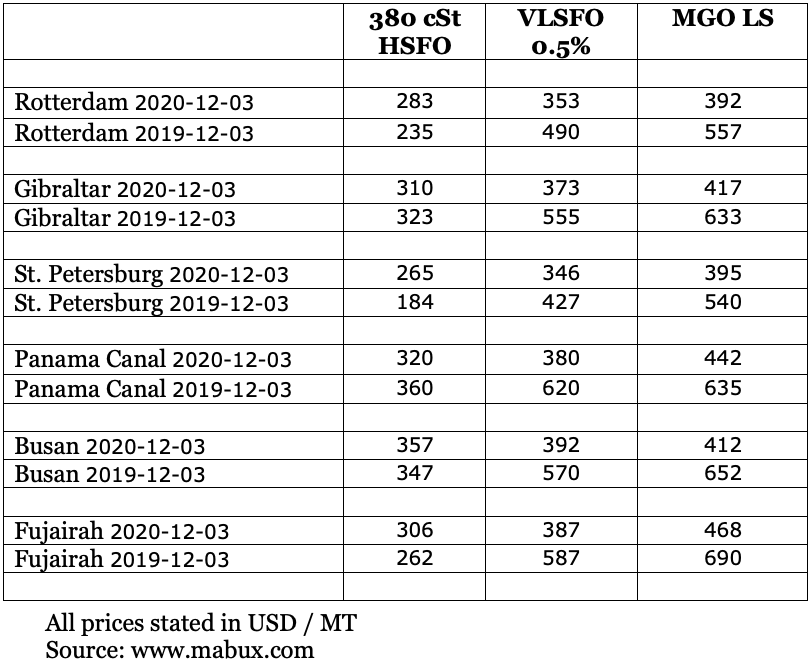Fuel market sentiment has received a boost from signs of improving demand from Asia’s large crude oil importers, as well as news of successful Covid-19 vaccine trials that may help contain the global pandemic and revive oil and fuel demand, according to the Marine Bunker Exchange (MABUX).
The World Bunker Index MABUX demonstrated firm upward evolution in November with the 380 HSFO index rose to US$324.60/mt, VLSFO added US$62.00 globally, reaching US$392/mt, while MGO LS also gained US$65.47 and jumped up to US$461.01/mt.

At the same time, the global scrubber spread (the spread, the price difference between 380 HSFO and VLSFO) has also followed general upward evolution in November, as it has widened by approximately US$5 and averaged US$57.41.
November results of collation between the Market Bunker Price Index (MBP) vs MABUX Digital Bunker Price Index (DBP) in the four major hubs (Rotterdam, Singapore, Fujairah and Houston) still showed slight overcharging of 380 HSFO and VLSFO bunker fuel in all ports selected, while MGO LS prices were undervalued in Rotterdam in November by average US$9 and in Singapore by average US$21.

Meanwhile, the governments of Japan and South Korea (although South Korea's response was removed from the list of responses with no reason given) along with a number of international shipping groups, have warned the European Union (EU) against its plan to add greenhouse gas emissions from the maritime sector to Europe’s carbon market.
As the 27-country EU seeks to steer its economy towards net-zero emissions by 2050, the executive European Commission (EC) wants to expand its carbon market to shipping. There has been some opposition tot he plan with organisations warning that adding shipping to Europe’s ETS could stoke trade tensions, and cause extra emissions by prompting ships to take longer routes to avoid stops in Europe.

In the meantime, the Shanghai International Energy Exchange (INE) is considering using oil storage sites in Singapore owned by PetroChina Co as a delivery point for its low-sulphur fuel oil futures contract, according to MABUX report.
The INE’s move would be the first time a Chinese futures contract would be deliverable outside of China and could boost liquidity for the contract, as well as help to influence pricing for shipping fuel.
Veritas Petroleum Services (VPS) has reported that the collapse in air and road travel has led to jet and motor fuels finding their way into the bunker pool, raising the volatility of all shipping fuels. When jet, gasoline and diesel are blended with marine fuels, it raises the prospect of lower flashpoints and with it the risk of fire on vessels.
VPS has released 38 bunker alerts in 2020 and 17 of them have been for flashpoint: the company has seen nine such alerts for marine gasoil, five for VLSFO and three for HSFO.









